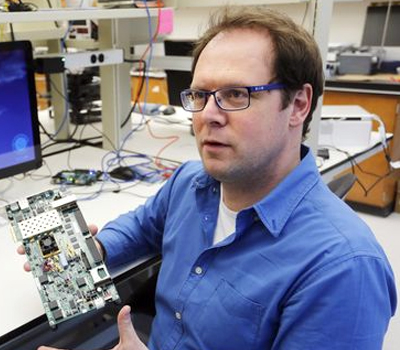Creating synthetic vision and communication systems for computers and machines
Computers already possess processing power far beyond the capability of the human brain. Yet as intelligent as these machines are, many sensory functions like sight and hearing remain elusive. Dr. Eugenio Culurciello, associate professor of Biomedical Engineering at Purdue University, is working to bestow computers and machines with the power of sight and visual, audio, and speech recognition. Having computers view the world exactly as humans do would greatly increase the practicality of having them carry out daily tasks and allow for graceful assistance in everyday duties. Never worry about losing your keys again, just have your computer search the couch cushions for them!
- Dr. Culurciello's research is driven by the desire to develop synthetic vision systems and efficient communication systems for computers and machines, enabling them to understand the content of images, videos, audio, speech, and music.
- With these abilities, computers will be able to respond to a video similar to the way humans do, by recognizing relationships between objects and actions and making inferences based on this information.
- This process begins by reverse-engineering the human brain and its capabilities.
- Dr. Culurciello writes computer algorithms that mimic the neural networks in the human brain.
- After testing these algorithms, new computer processors are made that are necessary for the computer program to function at optimal speed and efficiency.
- Dr. Culurciello specializes in the development of electrical technologies, specifically microchips and systems of computing devices and sensors for artificial machine sensory systems.
- These systems are low power (battery usage) and high performance, making them incredibly efficient.
- Drawing from his training in multiple fields, Dr. Culurciello's multidisciplinary research incorporates aspects from: electrical engineering, biomedical sciences, computational neuroscience, machine learning, computer science, applied mathematics, biology, optics, physics, electrochemistry, and more.
Computers and machines have already greatly improved our quality of life, and incorporating synthetic vision systems into existing technologies will allow computers to assist us in daily tasks. Robots are currently prevented from being useful in household situations due to their lack of vision capabilities and inability to intake visual information and understand the world. Dr. Culurciello's research would be utilized in the development of machines capable of performing daily chores and household tasks: cleaning dishes, walking the dog, etc. Other applications include cost-effective autonomous cars and developing vision systems for the blind.
Bio
Dr. Culurciello has over 15 years of experience working with brain-like algorithms, which have gotten vastly better within the last 5 years.
A genuine desire to help people and make life easier is a driving force behind Dr. Culurciello's research. His work will benefit the human lifestyles by reducing the time required for completing mundane and tedious tasks. This will free up more time for activities we love and enjoy.
Dr. Culurciello is a mentor in the Connecticut Pre-Engineering Programs' Mentor Program. The first national program to win a Presidential Award in Science, Mathematics, and Engineering Mentoring, the program provides outreach for K-12 under-represented children.
While currently with Purdue University, Dr. Culurciello has previous professional experience at Yale University, where he was an associate professor and director of the "e-Lab" VLSI design laboratory.
Dr. Culurciello is the recipient of the 2009 Presidential Early Career Award for Scientists and Engineers (PECASE), as well as being named a Distinguished Lecturer of the IEEE, Circuit and Systems Society (Institute for Electrical and Electronics Engineers) for 2011-2012. The same society awarded him "Best Paper" for his paper, "Fall detection using an address-event temporal contrast vision sensor."
Dr. Culurciello currently has a pending patent with Purdue University for the complex neural processor.
In the News
Hardware Designed Specifically to Run Complex Neural Networks Could Let Personal Devices Make Sense of the World
Giving smart phones the power to understand images
Purdue University researchers are developing a neural-networking chip, whose underlying artificial intelligence technology could be used by leading manufacturers to add image-recognition capabilities to mobile devices
In this paper we present a low power temporal-difference image sensor with wireless communication capability designed specifically for imaging sensor networks
Publications
Videos
Awards
Invited to the Microsoft Research Faculty Summit 2013, July 2013
Redmond, WA. SoC Conference, keynote talk, November 2, 2011, title: Vision for robots, vehicles and consumer electronics: how close are we?
Presidential Early Career Award for Scientists and Engineers (PECASE) 2009
Nominated by ONR program manager Thomas McKenna and Matthew Swiergosz. The Presidential Early Career Award for Scientists and Engineers (PECASE) is the highest honor bestowed by the United States government on outstanding scientists and engineers in the early stages of their independent research careers
Distinguished Lecturer of the IEEE, Circuit and System Society, 2011-2012
Presented by the IEEE
Yale Associate Faculty Fellowship
Presented by Yale University
Best Paper Award, IEEE Circuit and System Society
Presented for the IEEE ISCAS, 2008 paper "Fall detection using an address-event temporal contrast vision sensor"
Invited to the National Academies, NAFKI Complex Systems Conference
With full travel grant; November 13th-15th, 2008


